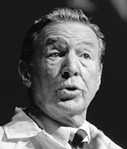Radio and television journalist and U-M alumnus Mike Wallace died on April 7. He was 93 years old.
Wallace’s stature as a broadcast journalism icon was rooted in his over 40-year tenure with the CBS News program “60 Minutes.” Wallace, AB ’39, HLLD ’87, of New York City was part of the original “60 Minutes” team when CBS News launched the magazine show in 1968. He worked as a correspondent emeritus for the show since 2006.

“Society will remember Mike Wallace as a dedicated, hard-charging journalist,” said President Mary Sue Coleman. “At the University of Michigan, we know him as that and so much more. He was extremely generous with his time, his papers, his financial support, and, most important, his belief in this university and its role in today’s world. We could not have asked for a more enthusiastic and loyal alumnus, one whose words and actions changed both the University of Michigan and the world beyond.”
Wallace, an enthusiastic and generous supporter of the university, was a leading contributor to the Knight-Wallace Fellows, a U-M program for mid-career journalists from the United States and abroad. He provided a $1 million gift to the program in 2002. Earlier he endowed a fellowship in investigative reporting and, with his wife, provided the building that houses the program, the Mike and Mary Wallace House. The Tudor house at 620 Oxford Street, built in 1911, was purchased for the fellows program in 1992.
Wallace also was a founding judge of the Livingston Awards for Young Journalists, the largest all-media, general reporting prizes in the field, which also operates out of Wallace House.
Charles R. Eisendrath directs the Livingston Awards and the Fellowships and called Wallace “the best kind of father-buddy-mentor.”
“I met Mike through the Livingstons and marveled the speed as well as the quality of his professional judgments. When I asked him to join a committee to buy a house for the Fellowships, he just turned to Mary and asked, ‘Why don’t we do it?’ The step that transformed the program by boosting its development potential took all of 15 seconds.”
Wallace also served as honorary co-chair of the Michigan Difference Campaign, the university’s largest-ever fundraising campaign. It exceeded its $2.5 billion goal in 2007, more than a year ahead of schedule, and raised more than $3.1 billion by the end of the campaign in 2008. In the 1990s, Wallace was volunteer co-chair of the Campaign for Michigan that raised $1.4 billion.
Wallace, who discovered his passion for broadcasting and journalism while working as a U-M student at the university’s 10-watt radio station and student newspaper, also donated a major collection of papers, documenting his 40-year career at CBS News, to Michigan’s Bentley Historical Library. The papers span his career at the network and “60 Minutes” and provide a window into the workings of television news.
The “60 Minutes” program files include transcripts of the broadcasts and interviews with participants, viewer correspondence, background research, newspaper clippings and photographs, and story ideas in various stages of development that were dropped or never aired. His collection also includes his work covering the war in Vietnam and political campaigns in the 1960s and 1970s.
Bentley Library Director Francis X. Blouin explained that the collection is of exceptional significance. “These papers reconstruct the thinking that lay behind groundbreaking television journalism,” he said. “Wallace’s well-created interviews explored the gamut of major issues of our time. His body of work is truly of historic proportions.”
Wallace served in a variety of volunteer capacities at the university, including as a member of the Depression Center’s National Advisory Board. He was one of the most prominent Americans to discuss his experience with depression publicly. An award also was established in his name, the Mike Wallace Leadership Award, which recognizes those who have demonstrated commitment, courage, support and leadership to conquer depression, bipolar illness and related illnesses.
“Mr. Wallace was a passionate advocate for openness, honesty, and forthrightness when discussing these and related brain illnesses. His messages and ‘voice’ appeared early in the fight, and he was uniquely powerful in perforating the national conspiracy of silence about mental illnesses,” said John Greden, director of the Depression Center. “Mike’s legacy in so many ways is that he ‘helped show the way.’ We still have much to do to achieve the vision that we shared and will continue to carry that torch.”
Wallace also contributed to LSA and to the Department of Intercollegiate Athletics. The Michigan Marching Band honored him with a halftime program in 2006.
Wallace was born May 9, 1918, in Brookline, Mass., the son of Russian Jewish immigrants. He graduated from high school in 1935 and attended U-M at the encouragement of his uncle Isaiah Leo Sharfman, a longtime chair of the economics department. After graduation, Wallace began his radio broadcasting career in Grand Rapids and at Detroit’s WXYZ, where he did news casting and narrated “The Green Hornet.”
Wallace was hired by the Chicago Sun’s radio station as a newscaster in 1941. He served as a naval communications officer during World War II and after the war worked as a reporter for radio station WMAQ Chicago.
He joined CBS in 1951, left the network in 1955 and returned in 1963 when he was named a CBS News correspondent, and anchored “CBS Morning News” from 1963 to 1966. CBS News executive producer Don Hewitt, with co-editors Mike Wallace and Harry Reasoner, launched the weekly news magazine “60 Minutes” in 1968.
Wallace was honored with the leading awards of the broadcast industry. In May 1987, he received an honorary doctorate of laws from U-M.
Wallace is the author of several books. “Mike Wallace Asks,” a compilation of interviews from “Night Beat” and “The Mike Wallace Interview” (1958); two memoirs “Close Encounter” (1984) and “Between You and Me” (2005), co-authored with Gary Paul Gates; and “Medal of Honor: Profiles of America’s Military Heroes from the Civil War to the Present,” co-authored with Allen Mikaelian (2002).

